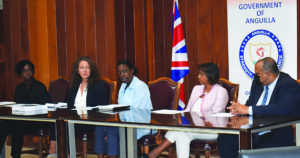
Disaster Risk Management Specialist and Team Lead, Mary Elinor Boyer, Chief Statistician, Lori-Rae Alleyne-Franklin and Honourable Premier, Dr. Ellis Lorenzo Webster


On Tuesday, 28 June 2022, the Government of Anguilla launched a program to improve its assessment and management of critical, government-operated assets such as schools, administrative buildings, and sports facilities. It also announced the finalization of a study designed to improve the collection and storage of data related to disaster management. Led by the Department of Infrastructure (DoI) and the Anguilla Statistics Department (ASD), these efforts will strengthen resilience in Anguilla and reduce the physical and financial risks of climate and disaster impacts.
They have received support from the European Union-funded Technical Assistance Programme for Disaster Risk Financing (DRF TA) in Caribbean Overseas Countries and Territories (OCTs). This DRF TA is part of the Resilience, Sustainable Energy and Marine Biodiversity Programme (RESEMBID), jointly implemented by Expertise France, the World Bank, and the Global Facility for Disaster Reduction and Recovery (GFDRR).
The DoI is tasked with advising government decision-makers on which structures are most in need of maintenance and has expressed a need to enhance the rigor of its assessment and reporting processes. Asset Management Systems (AMS) are critical for strengthening disaster risk management, risk reduction, and public financial management activities and will be instrumental in helping DoI achieve its mandate. The DRF TA is supporting the DoI in developing an AMS, which in turn, will help the DoI to design and implement its Building Maintenance Plan for all facilities in a portfolio that has grown significantly with the construction of new structures, financed by the UK Government, to replace those damaged by Hurricane Irma.
A properly implemented AMS will also optimize the use of available funds in preserving building assets at an acceptable level of serviceability, especially considering threats posed by tropical cyclones. As part of this effort, the World Bank hired INES Ingenieros, an experienced and qualified engineering consulting firm, to assess weaknesses and recommend options for a Building Management System to be used for planning the rehabilitation, maintenance, and repair activities of the public buildings in Anguilla.
Anguilla is also launching its report on “Developing Disaster-related Statistics Capacity”. Anguilla is one of the first countries to apply the internationally recognized Disaster-Related Statistics Frameworks (DRSF), developed in 2021 by the Economic and Social Commission for Asia and the Pacific (ESCAP). These frameworks are designed for use by national agencies to improve the quality and harmonization of statistics in support of monitoring and achievement of the Sendai Framework for Disaster Risk Reduction 2015-2030 and the Sustainable Development Goals. Disaster-related statistics also include statistical information used for disaster risk management and post-disaster impact assessments. As part of the report, a disaster-related statistical database was structured and documented for use in multiple forms and analyses, allowing the GoA to make decisions in a timely manner, with the knowledge and trust that the statistics used feature quality data and are consistent across the National Statistical System.
For further information on these projects, contact Nigel Connor, Deputy Chief Engineer, Ministry of Infrastructure at Nigel.Connor@gov.ai or Lori-Rae Alleyne-Franklin, Chief Statistician, Anguilla Statistics Department at lori-rae.alleyne@gov.ai.
– Press Release








